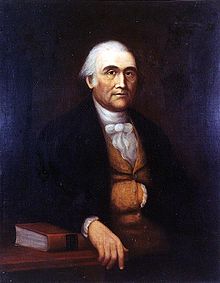This article includes a list of general references, but it lacks sufficient corresponding inline citations. (August 2011) |
Robert Smith | |
|---|---|
 | |
| 6th United States Secretary of State | |
| In office March 6, 1809 – April 1, 1811 | |
| President | James Madison |
| Preceded by | James Madison |
| Succeeded by | James Monroe |
| United States Attorney General Acting | |
| In office March 2, 1805 – August 7, 1805 | |
| President | Thomas Jefferson |
| Preceded by | Levi Lincoln |
| Succeeded by | John Breckinridge |
| 2nd United States Secretary of the Navy | |
| In office July 27, 1801 – March 4, 1809 | |
| President | Thomas Jefferson |
| Preceded by | Benjamin Stoddert |
| Succeeded by | Paul Hamilton |
| Personal details | |
| Born | November 3, 1757 Lancaster, Pennsylvania, British America |
| Died | November 26, 1842 (aged 85) Baltimore, Maryland, U.S. |
| Political party | Democratic-Republican |
| Spouse | Margaret Smith |
| Education | College of New Jersey (BA) |
| Signature | |
| Military service | |
| Allegiance | |
| Branch/service | Continental Army |
| Rank | Private |
| Battles/wars | American Revolutionary War |
Robert Smith (November 3, 1757 – November 26, 1842) was an American politician, diplomat, and admiralty lawyer. He served as the second United States Secretary of the Navy from 1801 to 1809 and the sixth United States Secretary of State from 1809 to 1811. He was the younger brother of Senator Samuel Smith.
Smith was a veteran of the American Revolutionary War and later graduated from Princeton University, then known as the College of New Jersey. As a respected lawyer, Smith became part of Baltimore's political elite, launching his political career under Thomas Jefferson and later James Madison.[1]
After a forced resignation from the Cabinet in 1811,[1] Smith served as president of the American Bible Society and the Maryland Agriculture Society. Retired from public office, Smith died in 1842.